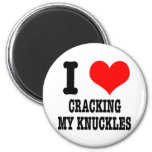One of my favorite early childhood memories is spending the night at my grandmother's house. I called her LaLa because she would sing to me before I'd fall asleep and when she'd forget the words, she'd sing, "la, la, la..." After playing outside, she'd take me into her pink tiled bathroom and would fill the sink with warm soapy water. She'd wash my hands with cocoa butter soap and it was hypnotizing. Between the massage, the steam and the scent of cocoa butter I'd become almost catatonic. She would then dry my hands with a soft fluffy towel and then massage cocoa butter lotion into my hands and along each finger. Her hands were always so soft and elegant. She'd often warn me never to crack my knuckles or else they would swell. I'd want my future engagement ring to fit over my knuckle, right? Of course I did!!! So for years to come, I'd crack in shame until I recently found the following article:
Cracking your knuckles does not actually hurt your bones or cause arthritis. The sound you hear is just gas bubbles bursting. Cracking your knuckles (or any of your joints) can have therapeutic benefits. When you crack one of your joints you are pulling the bones that are connected at the joint apart from each other. This process stimulates your tendons, relaxes your muscles, and loosens your joints. Chiropractors do this for spinal joints when your back is sore and stiff, but you can do this on your own for your knuckles, toes, knees, neck, etc.
Unfortunately, there can be too much of a good thing. Cracking your knuckles will never lead to arthritis (despite what your mom keeps telling you), but scientists have discovered that it can cause tissue damage in the affected joints. Knuckle-cracking pulls your finger bones apart which stretches your ligaments. Too much stretching of your ligaments will cause damage to your fingers akin to the arm injuries sustained by a baseball pitcher who throws too many pitches. In addition to making your hand really sore, this ligament damage can also result in reduced grip strength.
How does this work? Your joints, the places in your body where you can bend, are where your bones intersect and are held together by ligaments. These joints are surrounded by a liquid called synovial fluid. When you stretch your ligaments by pulling the bones apart to crack your knuckles a gas in the synovial fluid escapes and turns into a bubble. This process is called cavitation. Cavitation ends when the bubble eventually bursts, producing that popping sound we know and love. After that, your joints won't be able to crack for another 25-30 minutes while the gas gets reabsorbed into the synovial fluid.
ps. I was able to sport a nice rock while I was married so crack away!!

Cracking your knuckles does not actually hurt your bones or cause arthritis. The sound you hear is just gas bubbles bursting. Cracking your knuckles (or any of your joints) can have therapeutic benefits. When you crack one of your joints you are pulling the bones that are connected at the joint apart from each other. This process stimulates your tendons, relaxes your muscles, and loosens your joints. Chiropractors do this for spinal joints when your back is sore and stiff, but you can do this on your own for your knuckles, toes, knees, neck, etc.
Unfortunately, there can be too much of a good thing. Cracking your knuckles will never lead to arthritis (despite what your mom keeps telling you), but scientists have discovered that it can cause tissue damage in the affected joints. Knuckle-cracking pulls your finger bones apart which stretches your ligaments. Too much stretching of your ligaments will cause damage to your fingers akin to the arm injuries sustained by a baseball pitcher who throws too many pitches. In addition to making your hand really sore, this ligament damage can also result in reduced grip strength.
How does this work? Your joints, the places in your body where you can bend, are where your bones intersect and are held together by ligaments. These joints are surrounded by a liquid called synovial fluid. When you stretch your ligaments by pulling the bones apart to crack your knuckles a gas in the synovial fluid escapes and turns into a bubble. This process is called cavitation. Cavitation ends when the bubble eventually bursts, producing that popping sound we know and love. After that, your joints won't be able to crack for another 25-30 minutes while the gas gets reabsorbed into the synovial fluid.
ps. I was able to sport a nice rock while I was married so crack away!!

No comments:
Post a Comment